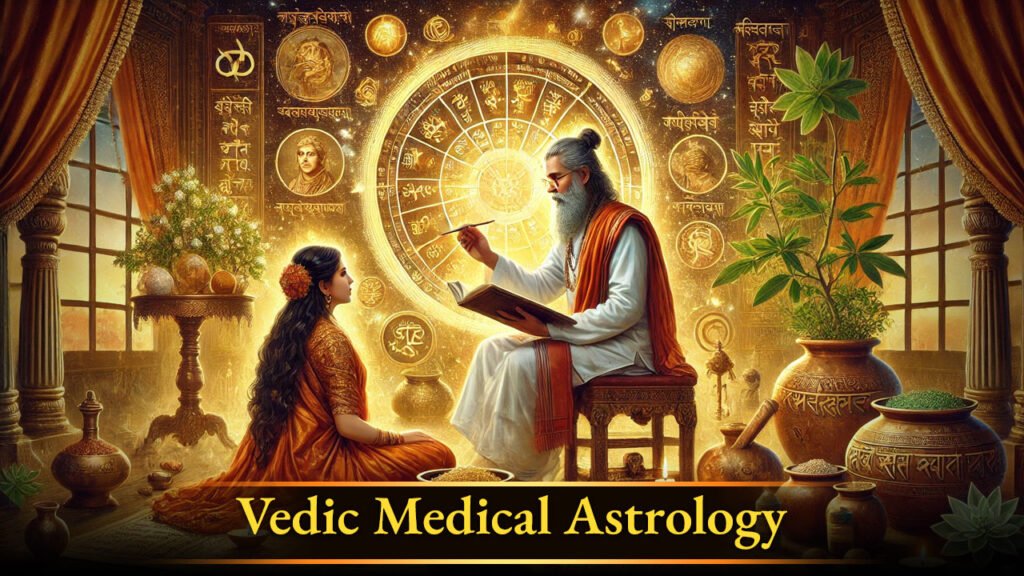Introduction to Vedic Medical Astrology
Hindu medical astrology, also known as Vedic medical astrology, is a fascinating branch of astrology deeply rooted in ancient Indian traditions. It combines the principles of astrology with Ayurveda, India’s traditional system of medicine, to provide insights into an individual’s health and well-being based on their natal chart. This intricate system has been practiced for centuries and continues to intrigue those interested in holistic health approaches.
Read Also: Astrology for Marriage Bliss
The Origins and Philosophy
The origins of Hindu medical astrology can be traced back to the Vedic period, where the sages or rishis meticulously studied the cosmos and its influence on human life. They believed that the positions of celestial bodies at the time of one’s birth could significantly impact their physical, mental, and emotional health throughout their life.
Central to this philosophy is the concept of “Karma,” which suggests that past actions influence present circumstances, including health. By examining the planetary alignments at the time of birth, practitioners can uncover potential health issues and suggest preventive measures or remedies.
Read Also: Astrology Fixes for Marriage Woes
Key Components of Hindu Medical Astrology
- Nakshatras (Lunar Mansions): The zodiac is divided into 27 Nakshatras, each associated with specific body parts and health conditions. For example, Ashwini Nakshatra governs the head and eyes, while Rohini influences the throat and neck. Understanding these associations helps astrologers identify vulnerable areas of the body.
- Planetary Influences: Each planet is linked to different organs and systems within the body. For instance:
- Sun: Governs the heart, spine, and overall vitality.
- Moon: Associated with blood circulation, mental health, and fluid balance.
- Mars: Linked to muscular strength, energy levels, and inflammatory conditions.
- Mercury: Influences the nervous system, skin, and respiratory functions.
- Jupiter: Affects the liver, pancreas, and digestive health.
- Venus: Connected to reproductive health and urinary functions.
- Saturn: Governs bones, teeth, and chronic ailments.
- Houses in the Natal Chart: The twelve houses in a Vedic birth chart represent various aspects of life, including health. The sixth house is particularly significant as it pertains to diseases, injuries, and recovery. The eighth house deals with longevity and chronic illnesses, while the first house (ascendant) reflects general health and vitality.
- Dasha System: The Vimshottari Dasha system is a predictive tool used in Vedic astrology to determine periods when certain planets will exert more influence over an individual’s life. During these periods, specific health issues may arise, depending on the nature of the ruling planet.
- Graha Doshas: Certain planetary combinations or afflictions, known as Graha Doshas, are believed to cause specific health problems. For example, Mangal Dosha (affliction caused by Mars) can lead to accidents, surgeries, or aggressive behaviors affecting health adversely.
Diagnosis and Remedies
Astrologers use a combination of techniques to diagnose potential health issues:
- Detailed Birth Chart Analysis: Examining the positions of planets, their aspects, and conjunctions to identify weak points.
- Transits and Progressions: Monitoring current planetary movements and their interactions with the natal chart to predict timing of health events.
- Compatibility Analysis: In some cases, comparing charts between family members to understand inherited tendencies or shared health concerns.
For interesting astrology-related videos, subscribe to us on YouTube
Once potential issues are identified, various remedial measures are suggested:
- Gemstone Therapy: Wearing specific gemstones can mitigate negative planetary influences. For example, wearing a ruby for Sun-related issues or emerald for Mercury-related problems.
- Mantras and Yantras: Chanting specific mantras and using yantras (geometric diagrams) can harmonize planetary energies and improve health.
- Ayurvedic Treatments: Integrating dietary changes, herbal remedies, and lifestyle adjustments recommended by Ayurveda to balance bodily humors (doshas).
- Charity and Rituals: Performing charitable acts or conducting rituals like homas (fire ceremonies) to appease afflicted planets.
Modern Relevance and Criticism
While many find value in Hindu medical astrology for its holistic approach, integrating mind, body, and spirit, it is not without criticism. Skeptics argue about the lack of empirical evidence supporting astrological claims. However, proponents believe that astrology provides a complementary perspective rather than a replacement for conventional medical practices.
In contemporary times, interest in alternative healing methods has surged, leading to a resurgence in exploring ancient wisdom systems like Vedic astrology. Many individuals seek consultations alongside modern healthcare to gain deeper insights into their well-being.
Read Also:https://hanishbagga.com/astrology/success-with-astrology/
Frequently Asked Questions (FAQs)
1. What is the difference between Vedic and Western medical astrology?
Answer: Vedic medical astrology originates from ancient Indian traditions and integrates Ayurveda, focusing on karmic influences and planetary positions at birth. It uses the sidereal zodiac, which aligns with actual star positions. Western medical astrology, on the other hand, often relies on the tropical zodiac and incorporates elements of Greek and Roman mythology. The interpretations and methodologies differ significantly between the two systems.
2. Can Hindu medical astrology cure diseases?
Answer: Hindu medical astrology does not claim to cure diseases directly but aims to identify potential health vulnerabilities and suggest preventive measures or supportive therapies. It works best as a complementary practice alongside conventional medicine and holistic treatments like Ayurveda.
3. How accurate is medical astrology in predicting health issues?
Answer: The accuracy depends on the skill of the astrologer and the complexity of the individual’s chart. While some people report remarkable insights and timely predictions, others may find discrepancies. It’s essential to approach medical astrology with an open mind and consider it as one of many tools for understanding health.
4. Are there any scientific studies supporting Vedic medical astrology?
Answer: As of now, there are limited scientific studies validating Vedic medical astrology due to the subjective nature of astrological interpretations. Most evidence remains anecdotal. However, ongoing research in consciousness studies and quantum physics occasionally explores connections between cosmic influences and human biology.
5. Should I consult a Vedic astrologer if I have health concerns?
Answer: Consulting a Vedic astrologer can provide additional perspectives on your health, especially regarding predispositions and preventive care. However, it should never replace professional medical advice. Always consult qualified healthcare providers for diagnosis and treatment while considering astrological insights as supplementary information.

